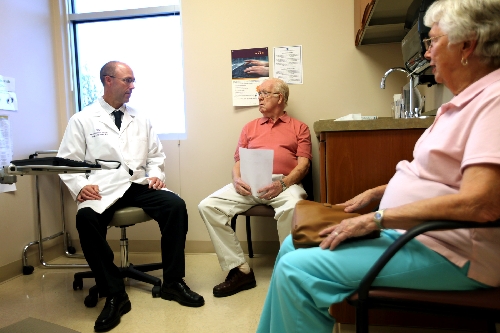Doctors limited in ways to treat Alzheimer’s patients
Two doors down, a patient carries a tune like a piano falling down a stairwell. But in this room a woman lies quietly, tightly curled up on her bed, self-swaddled in a blue blanket so that even her head can't be seen, seemingly afraid of whatever she might see.
"How are you?" nurse Alma Angeles cheerfully asks the blanketed figure.
Silence.
"I sure hope you're having a good day," Angeles adds.
More silence, but then the patient lets out an audible breath that she apparently was holding.
It's midday on 2 South at University Medical Center, where emergency mental health patients are placed until they can be transferred to an appropriate facility.
The woman swaddled in the blanket, who pulls her cover even tighter, has been diagnosed by UMC physicians with Alzheimer's disease, the most common form of dementia, a degenerative brain disorder that steals memory. She arrived at the hospital about four months ago without identification and without the ability to ID herself.
Unlike others with Alzheimer's and those with assorted other mental problems who temporarily end up here, as many as 15 a year, this woman wasn't found wandering the streets.
She is an example, hospital officials say, of a phenomenon common enough to be given a name ---- "granny dumping" - in which families drop off bewildered women with obvious memory deficits at the ER curb in the middle of the night. The horrific practice, in which the woman is often found by security officers sobbing hysterically, now occurs about six times a year here.
How the woman wrapped in a blanket came to be diagnosed and treated for Alzheimer's is not, of course, the norm in Nevada or anywhere else. The usual route occurs after a family member's mind becomes jumbled and a worried relative takes a wife or husband or mom or dad to the doctor.
A complex and progressive disease, Alzheimer's can cripple entire families emotionally and financially as a loved one regresses into aggressive childlike behavior, where toilet training isn't an option and independence can mean a forgotten lit stove burns down the family home. As Southern Nevadans whose relatives are either within the throes of Alzheimer's or who have died from it well know, doctors, with far more questions about the disease than answers, are severely limited in offering help, or hope, to families.
Today, Alzheimer's is the sixth- leading cause of death in the United States, and it is the only one among the top 10 in America without a way to prevent, cure or even slow its progression.
FEW TREATMENT OPTIONS
While many think it only a disease of old age, Deb Newton of Las Vegas knows better. Her husband, Joe, first showed signs of Alzheimer's in his mid-40s and died from the disease at age 58. About 200,000 of the estimated 5.4 million people currently with the disease are younger than 65. Some are in their 30s.
The few drugs approved by the FDA to treat Alzheimer's have demonstrated only modest effects in modifying clinical symptoms for relatively short periods, and none has shown a clear effect on disease progression or prevention. Other drugs are frequently prescribed for emotional or behavioral problems that often accompany the disease, including depression, anxiety, insomnia, paranoia, hallucinations, severe agitation and hostility.
Complicating medical treatment for people with Alzheimer's is that they are far more likely to be hospitalized than other older adults, often for preventable reasons such as an infection that wasn't noticed early enough, generally because the patient was unable to communicate the symptoms. Recent studies about such hospital stays reached a sobering conclusion: They increase mental decline and increase the risk of going into a nursing home or dying.
Jerome Snyder, a multimillionaire entrepreneur whose wife, Diane, had Alzheimer's for 12 years before her death in September, said he searched the world for a treatment for the disease.
"Regardless of my financial wherewithal, I could not eradicate the disease for Diane," says Snyder, who now sits on the board of Keep Memory Alive, the fundraising arm of the Cleveland Clinic Lou Ruvo Center for Brain Health in downtown Las Vegas. "That weighed heavily on me. I am a Type A personality."
While he did go to Europe to acquire a drug, Namenda, for his wife before its 2003 availability in the United States - it had already been available overseas for many years to treat moderate to severe Alzheimer's - Snyder said it did not improve the quality of her life but may have prolonged progression of the disease.
Dr. Charles Bernick, a neurologist and associate medical director of the Ruvo Center, prefers not to paint a bleak picture of treatment for those with Alzheimer's.
"To me, there is always something you can do," he says, stressing that medications as well as human interventions can help with mood and behavior. Other medical treatments can help an individual feed himself and stave off incontinence.
"We are able to make people more comfortable," he observes.
EARLY INTERVENTION HELPS
Even with the limitations in treatment, experts agree it is best to recognize symptoms of Alzheimer's early because medication to control symptoms is most effective in the early stages of the disease. Early diagnosis also enables the individual and family to better plan for the future.
That planning may include finding ways to find and fund care both inside and outside the home, which is critical to the comfort and well-being of both the Alzheimer's patient and family.
But Alzheimer's is seldom diagnosed early, Bernick notes, even in people who visit primary care doctors with memory complaints. Often patients and families underreport symptoms, or problems are seen as a normal part of aging. And when symptoms emerge gradually, they may not be as easily recognized.
"There has to be more awareness of the disease in and out of the medical field," Bernick says.
It is also true that some people are aware of symptoms and go to great lengths, such as writing crib notes on what had been, say, easy computer use, to conceal memory problems.
"It's easy to be convinced by someone that what you're seeing is just caused by someone working too hard or lack of sleep," says Toni Wombaker, whose mother, Yvonne Jensen, has Alzheimer's. "You don't want someone you love to have it. ... It was at least two years after we started worrying about how she was acting that she was diagnosed. At first I took her to a primary physician and then a neurologist, who did a standard mental state exam and a brain scan and said she had depression. By the time she was diagnosed with Alzheimer's, it was really too late then for the medications to help her."
Early signs of Alzheimer's include: memory loss that disrupts daily life; challenges in planning or solving problems; difficulty completing familiar tasks at home, at work, at leisure; confusion with time or place; trouble understanding visual images and spatial relationships; new problems with words in speaking or writing; misplacing things and losing the ability to retrace steps; decreased or poor judgment; withdrawal from work or social activities; and changes in mood or personality.
KEYS TO IDENTIFYING DISEASE
About four-and-a-half years ago, Jerry Kinersly, a former banker, first noticed that his wife, Verna, couldn't find things as readily in the house and was having more trouble than usual with names. She often would repeat questions.
Both 83 and married for nearly 60 years, the Kinerslys, the parents of four children, retired to Las Vegas in 1987 after spending most of their lives in Oregon. During a trip to his wife's primary care doctor, Kinersly told Dr. Craig Morrow about the changes he had seen in his wife.
What unfolded from that visit is a textbook example of how gerontologists prefer patients and families dealing with the disease to be treated.
Kinersly appreciated Morrow's thorough explanations about the disease, whose course is marked by a continual loss or neurons or nerve cells as well as their connections with other neurons so critical to memory and other mental functions. In advanced Alzheimer's, the dramatic loss of neurons causes the brain to shrink. Also diminished are levels of brain chemicals known as neurotransmitters, which carry complex messages among billions of nerve cells. As the disease progresses, people fall into an increasingly dependent state.
Though a definitive diagnosis of Alzheimer's can be made only through an autopsy, by linking clinical measures with an examination of brain tissue, Morrow, who worked with neurologist Dr. Howard Ehrenfeld on Verna Kinersly's case, told the Kinerslys that a largely accurate diagnosis of Alzheimer's could be made by:
■ Asking questions about overall health, past medical problems, ability to carry out daily activities and changes in behavior and personality.
■ Conducting tests of memory, problem solving, attention, counting and language.
■ Carrying out standard medical tests, such as blood and urine tests, to identify other possible causes of the problem.
■ Performing brain scans, such as computed tomography (CT) or magnetic resonance imaging (MRI), to distinguish Alzheimer's from other possible causes for symptoms.
After a battery of questions and tests, Verna Kinersly was judged to have a mild to moderate form of the disease. The Kinerslys learned that people with the disease have low levels of acetylcholine, an important brain chemical involved in nerve cell communication. And that medications known as cholinesterase inhibitors can slow the metabolic breakdown of acetylcholine, making more of this chemical available for communication between cells, which can help to slow the progression of cognitive impairment and can be effective for some patients in the early to middle stages of the disease.
Of the four inhibitors, Aricept, Exelon, Razadyne and Cognex, Verna was prescribed Aricept. She couldn't tolerate the side effect of diarrhea, however, and was moved to Exelon. Cognex is seldom used any more because of side effects that include severe gastrointestinal problems and possible liver damage.
Many patients, as their disease progresses, take Namenda in addition to a cholinesterase inhibitor, often Aricept. Namenda, approved by the FDA to treat the symptoms of moderate to severe Alzheimer's, appears to protect the brain's nerve cells against excess amounts of glutamate, a chemical released in large amounts by cells damaged by Alzheimer's. Morrow and neurologist Ehrenfeld have yet to determine what medications Verna will take in the future.
FACING ALZHEIMER'S OPENLY
After discussions with Jerry Kinersly, Ehrenfeld agreed that Verna would be a good candidate for a clinical trial. She is part of a Ruvo Center trial overseen by center neurologist Bernick to see whether a vaccine can stave off progress of the disease.
Morrow now acts as a kind of quarterback for the Morrow-Ehrenfeld-Bernick medical team caring for Verna. If need be, his practice at Southwest Medical Associates also has social workers and psychologists available. It is the kind of collaboration that the Alzheimer's Association salutes as best for patients and their families.
With computerized records, Morrow said it is easy for him to keep track of treatments doctors use on Verna Kinersly, which is especially important in making sure prescribed drugs don't have a negative interaction.
Jerry Kinersly tries to stay upbeat, though the disease has largely robbed him of his wife's humor. He often tells her jokes that he's not sure she gets. So far he has been able to take care of her at home by himself, which researchers say about 80 percent of Americans do for loved ones with Alzheimer's.
As her disease has progressed, Verna's ability to engage in conversation has basically ended. She still lights up a room with her smile.
"I know I'm so lucky, that she's still sweet," he says as he sits with his smiling wife at the Ruvo Center. "As soon as she was diagnosed, we decided not to be ashamed of the disease. I often tell people that's why she doesn't engage in conversation. I don't want people to think this is something we can't talk about. We need to bring as much attention to it as possible so more research is done, so we do as much as possible for both patients and their families."
For now, Verna still attends sewing classes at a recreation center for senior citizens in Summerlin. And she loves to work with plants in the yard. Jerry Kinersly does most of the cooking, afraid that his wife might forget to turn off the stove.
"I really don't want that kind of accident to happen," he says. "Besides, it's fun to work together."
Their recent cruise to the Panama Canal will be their last big trip, he says. She was often confused aboard ship because of the unfamiliar surroundings, he noted, even losing items in their room. Her mobility problems kept them aboard ship at ports.
HOSPITALS CAN COMPLICATE MATTERS
While Verna Kinersly's medical problems outside of Alzheimer's are not severe, many Alzheimer's patients suffer from other conditions, which are often exacerbated by an inability to communicate symptoms.
In addition to his Alzheimer's, Patsy Quinn's husband, 82-year-old Virgil "Gene" Quinn, a former meteorologist with the Atomic Energy Commission in Nevada, had medical issues with his colon, feet, kidneys and lungs. He also had a problem with blood clots. It's not uncommon for the 77-year-old mother of three, who largely cares for her husband alone, to put almost 2,000 miles on her car in a year taking him to doctor's appointments.
Hospitalizations for medical treatment haven't been easy.
"Morphine made him act crazy," she says. "And he becomes so scared by people waking him up all the time that he tries to tear everything out. It's all so strange and scary to him."
Ruvo neurologist Bernick said hospital staffs are generally not trained to deal with people with cognitive impairment.
Sleep medications, narcotics and anti-anxiety drugs that work perfectly well on most people can result in dementia patients acting more confused and agitated.
"It would be good for hospitals everywhere to go through training sessions," Bernick says. "The number of Alzheimer's patients with a treatable condition is only going to grow."
Vicki Huber, the chief nursing officer at UMC, has Bernick scheduled for a training session there this month.
"We want to be as up to date as possible," she says.
Planning ahead, Bernick said, can make hospitalization less difficult for everyone. A private room, with hospital staff waking up a patient only when absolutely necessary, can help. So can having tests before the hospital visit. The type of drugs to be used should be discussed with a neurologist who understands how medications can affect someone with Alzheimer's. Family should be there around the clock so the dementia patient has familiarity with someone.
Bernick said the best thing to do is completely avoid the hospital. But if a procedure is necessary, families should see if a less busy outpatient clinic could be used.
The less energy and "the more quiet in the environment," the better, he says.
BACK ON 2 SOUTH
There is little noise on 2 South as the woman who was dumped at UMC, and later found to have Alzheimer's, sleeps. Dr. Bob Mull sits at a counter and does paperwork on the mental health patients on the floor.
UMC does not have a mental ward, but individuals who were brought here on emergency basis stay in this largely secure unit until they can be transferred to an appropriate facility. They are schizophrenics and Alzheimer's patients and people whose brains have been scrambled by alcohol and dope - men and women generally brought in by police, people found wandering in the community with no idea of who or where they are.
An attendant sits at the door of each room to make sure they don't try to leave.
The woman with Alzheimer's will be transferred to a structured group home soon.
Because of federal privacy laws, Mull cannot get specific about the woman.
"It's so sad, so sad," he says, shaking his head.
As they so often do with patients who don't know their name, UMC officials engaged in detective work to find out who she is.
Sometimes a name will slip out as a patient talks, Mull said. Sometimes fingerprints work.
Sometimes relatives who dump off a loved one, apparently feeling guilty, come back to see how the person is doing.
"We don't let them take them," he notes, adding that government officials take over guardianship.
Mull said the woman who was dropped off at UMC believes she was left there because she couldn't control her bowels.
"She said her husband loves her very much and she knows they'll be getting back together."
Contact reporter Paul Harasim at pharasim@ reviewjournal.com or 702-387-2908.
Alzheimer's disease: A Rising Storm
The Review-Journal presents a series about Alzheimer's disease and its impact on society, today and potentially in the future.
• An overview outlining the prevalence of the disease and efforts by families to cope with it and by researchers to treat and cure it
• The financial impact of the disease on families and society
• Challenges for the 80 percent of Americans who choose to care for their loved ones with Alzheimer's disease at home
• Alternative forms of care, from day care to assisted living and nursing homes
Upcoming:
Wednesday
• Debate about the benefits of testing for Alzheimer's
Thursday
• The state of Alzheimer's research and what is needed in the future
FINDING HELP
These are local organizations that help people with Alzheimer's disease and their families. Some accept volunteers.
Alzheimer's Association, Desert Southwest Chapter, Southern Nevada Region
The association offers general information, support groups, educational programs, referrals and opportunities to volunteer.
Address: 5190 S. Valley View Blvd., Suite 104, Las Vegas, NV 89118
Phone: 702-248-2770
24-hour Helpline: 800-272-3900, operates seven days a week, in 140 languages
Cleveland Clinic Lou Ruvo Center for Brain Health
Address: 888 W. Bonneville Ave., Las Vegas, NV 89106
Phone: 702-331-7054
Appointments: 702-483-6000, Option 2
Information about services and programs for caregivers and families: 702-483-6023
Information about enrolling in a clinical trial: 702-685-7073 or brainhealth@ccf.org
Donations: Cleveland Clinic Lou Ruvo Center for Brain Health Philanthropy Institute, 702-331-7052
Volunteer: 702-331-7046
Keep Memory Alive: 702-263-9797































